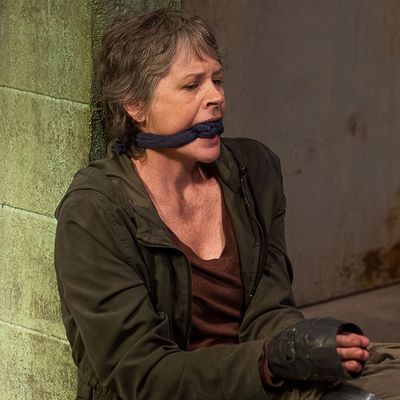
For a while there, Carol looked like The Walking Dead’s ultimate poster child: She was the battered housewife turned ruthless killer, the post-apocalyptic equivalent of pulling yourself up by the bootstraps. When we meet Carol in season one, she appears mostly in the background, shaky and meek, taking orders from her louse of a husband. But over five seasons, she became the cutthroat pragmatist of the group, the one who would survive by any means necessary. She killed and burned her two flu-ridden comrades Karen and David at the prison, in an attempt to stop the infections; she killed a little girl, Lizzie, who had just killed her own sister; she single-handedly saved the group from the cannibal cabal at Terminus. She started off as a victim, but Carol was a survivor now, the Ayn Rand of zombieland.
But during Sunday night’s episode of The Walking Dead, “The Same Boat,” something happened: Carol returns to the role of the mousy victim, earning the nickname “little bird” from her captors, and it’s unclear if it’s an act. She’s bound and gagged on the floor alongside Maggie when she begins to hyperventilate, eyes tearing. Her captors remove her gag, and one of them looks at her, puzzled and almost disgusted. “Look at you,” she says. “Bitch, how did you make it this far?”
It happens that the person taunting her is, like Carol, a badass woman. In fact, the primary antagonists of the episode were women — a feature demonstrative of just how much has changed in the world of The Walking Dead since the early days of Carol, when she always had to be saved by another man: Shane, Rick, Daryl. During the first season, the show had a caveman division of labor, where the women did the cooking and the laundry as the men strutted about protecting the land. But over time, survival has necessitated the need for a quasi-feminist sensibility, where gender is less important than toughness. As a member of Team Negan, Paula (played by Alicia Witt) has no problem killing her lover for disobeying her orders, and reminisces about how the first person she ever killed in order to survive was her boss. She represents what Carol could become if she continues to kill without remorse.
But instead of edging Carol closer to an amoral abyss, The Walking Dead is making her pause and reconsider. The relentless killing has taken its toll, and she awoke from her tussle with Morgan chastened and sick with guilt. She’s counting (miscounting, perhaps) the number of people she has killed. She didn’t go for the kill shot when one of Negan’s crew pulled a gun on them in the woods. She hesitates when the time comes to kill Paula, telling her to run first. Carol isn’t a little bird, but she’s no longer a hawk either. The lingering question for Carol now is: Can you survive in this world without being a hawk?
A friend of mine once joked that the tagline for The Walking Dead should be “Boys and women becoming men.” She was talking about the evolution of Carl and Carol, but it’s true for all the characters. The recent mid-season premiere saw this ethos at work in the extreme. The characters who died — Jessie, followed by her sons Sam and Ron — couldn’t survive because they were paralyzed by their fear. They made bad decisions; they didn’t listen to Rick. Instead The Walking Dead rewarded those who overcame their fear: Formerly lame ducks like Father Gabriel and Eugene took up arms to help Rick and beat back the zombie horde, with the episode climaxing in an ecstatic montage of their faces as they slayed the undead.
The question when it comes to Carol then becomes, how much of what happened during Sunday’s episode was a performance? Carol, after all, has become terrifyingly good at deception, a woman adept at wearing a cheerful Stepford mask and baking cookies while pawing guns from the armory in Alexandria, but there’s a real sense that the mask is slipping and Carol is losing her sense of self. Melissa McBride, the actress who plays Carol, says the performance is deliberately unclear. “As viewers, we’re not sure: Was that real or not?” McBride told E! in a post-mortem interview. “She’s going in and out of a lot of things and it’s difficult to discern if this is her for real or if this is another ruse.” If the former, will Carol be long for this world?




